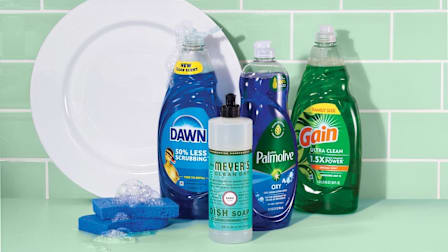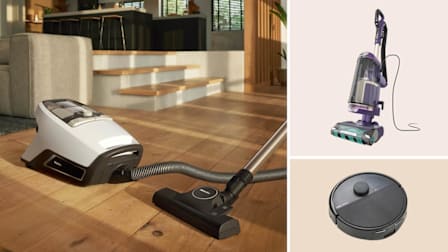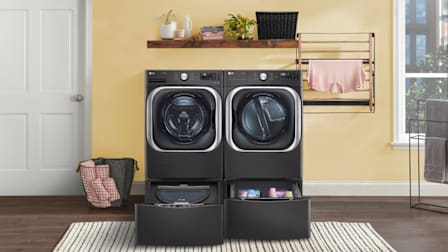Read This Before Using an Oven Cleaner to Clean Away Those Burnt-On Messes
Some oven cleaners can actually harm certain ovens over time

In the aftermath of the holidays, your oven might not be a pretty sight. A roasted turkey probably splattered grease all over the interior of your oven. Your dishes could have dripped cheese, which is a nightmare to remove once it’s burnt. Or there could be so much food residue from all of the cooking you had to do that your oven is sticky to the touch.
A dirty oven can lead to some unsavory side effects. For one, the more soiled your oven is, the more likely it’ll produce smoke and odors, says Tara Casaregola, who oversees oven testing at Consumer Reports.
Accidental flavor transfer might also occur, where you might be baking cookies but have them come out tasting like chicken or roasted onions, says Paul Hope, a home and appliances senior writer at CR and former chef. And in more extreme cases, if your oven gets into a filthy enough state, it might also affect the performance of the appliance.
For Starters, How Often Should You Clean Your Oven?
As a rule, it’s worth cleaning up messes in your oven as soon as you see it to avoid having to work harder down the road to remove the buildup. Just be mindful that you should wait until the oven interior has cooled to a safe-to-touch temperature before you start tackling any spills or splatters.
How often should you do a thorough cleaning? “In general, it’s best practice to clean your oven thoroughly every three to six months,” says Bree Lemmen, the kitchen brand manager of Whirlpool.
However, you might want to do a deep cleaning more frequently, depending on how often you use the oven and how messy it gets. For example, if you regularly roast fatty meats in the oven, it’s probably better to clean your oven once a month, Hope says.
Should You Use an Oven Cleaner on Your Oven?
As a rule, you should check your oven manufacturer’s recommendations before you use a chemical oven cleaner. Manufacturers may specify different cleaning procedures for different models, says Alex Minkin, the associate director of appliances testing at Consumer Reports.
If you don’t have your owner’s manual at hand, you can contact customer service from your oven manufacturer for cleaning instructions, Minkin says.
Use a chemical oven cleaner if the product is certified for cleaning ovens and your oven manufacturer allows for it, says Amelia Hensley, director of cooking systems at GE Appliances.
You should be especially cautious with self-cleaning ovens. Chemical oven cleaners can damage the enamel surfaces of the oven’s cavity with repeated use, says Yooshin Kim, senior manager of quality engineering at LG Electronics.
Minkin agrees. Those damages can lead to the reduction of the self-cleaning performance of your oven, a change that is likely to be irreversible, Minkin says.
Damage to the coating can also result in permanent discoloration, cracking, and chipping, which can shorten the life of your oven. Many times, the damage occurs in parts of the oven that are not serviceable, which may require full replacement of the oven, Hensley says.
So, in short, consult your oven manufacturer’s website or your user manual first to see what cleaning products and methods are allowed. Your oven—and your wallet—will thank you for it.
What Are Other Cleaning Alternatives?
If you want to give your oven a deep cleaning, consider using products that are less abrasive.
Household materials that are usually safe for cleaning include dish soap, baking soda and water, white vinegar diluted with water, and lemon juice, says Gerrod Moore, kitchen brand manager of Maytag. Though it’s still a good habit to check the owner’s manual of your oven before you start cleaning.
For your oven racks, you can soak them in a sink in dish soap for at least 2 hours or even overnight and use a stiff-bristled brush to target tougher areas of grime, Lemmen says.
If your racks are too large to fit in the sink, consider soaking them in a bathtub, Lemmen says. As a pro tip, line your bathtub with towels beforehand to avoid the oven racks scratching up the surface of your tub.
For the inside of your oven, you can use dish soap and warm water along with a non-scratching sponge. Soften stubborn soils by covering them with a wet, soapy dishcloth for 10 to 20 minutes before wiping, Hensley says.
Baking soda and vinegar will also work. You can create a paste using baking soda and water to apply throughout the oven, and then spray with lemon juice or white vinegar and wipe with a wet rag, Lemmen says.
More on Cleaning
Check out the things you should never clean with vinegar.
If you want to remove any lingering odors in your oven after cleaning, put your oven on low heat and fill a baking dish with water and either lemon juice, white vinegar, or vanilla for about an hour, Lemmen says. Many oven-safe dishes can handle these ingredients, but to be safe, check your baking dish’s care instructions beforehand.
If your oven has a self-cleaning setting, try running the self-clean cycle. Before you use the self-clean feature, remember to wipe off any grease and remove loose food debris, Hensley says.
Don’t use the self-cleaning function while you’re using any other cleaning materials simultaneously, Lemmen says. And make sure to open your windows and turn on your kitchen ventilation hood to provide ventilation when you run the self-clean cycle.




